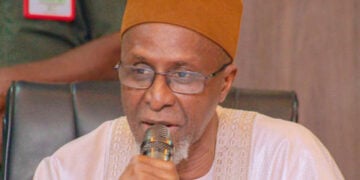Northern leaders, stakeholders, and civil society actors have declared strong support for President Bola Tinubu’s administration, citing commendable progress on electoral promises in security, infrastructure, and economic reforms.
This was contained in a communiqué signed by the Director General of the Sir Ahmadu Bello Memorial Foundation (SABMF), Engr. Abubakar Gambo Umar at the end of a two-day interactive session on Government-Citizen Engagement, held at Arewa House, Kaduna between Tuesday and Wednesday.
The high-level summit brought together government officials, security agencies, traditional and religious leaders, development partners, civil society, and the private sector, to assess electoral commitments and deepen dialogue for national unity.
President Tinubu was represented at the Summit by the Chairman of the Nigeria Governors’ Forum, Governor Abdulrahman Abdulrazaq of Kwara State, while the Vice President, Senator Kashim Shettima, was represented by Dr. Aliyu Modibbo Umar, special adviser to the President on Special Duties in his office.
Kaduna State governor, Senator Uba Sani served as chief host, with Gombe State governor and Chairman of the Northern States Governors’ Forum (NSGF), Inuwa Yahaya, attending as special guest.
The Secretary to the Government of the Federation (SGF), Senator George Akume, led the federal delegation, alongside the National Security Adviser (NSA) Mal Nuhu Ribadu, Service chiefs, cabinet ministers, and heads of key agencies.
Delivering the keynote address, Nigeria’s Permanent Representative to the United Nations, Professor Tijjani Bande, highlighted the resilience of Nigeria in the face of global and domestic challenges.
He called for strategic negotiation of Northern interests within the broader framework of national development goals.
Participants at the summit acknowledged the administration’s openness to dialogue, noting that many campaign promises are being fulfilled, particularly in security operations, infrastructure expansion, and economic recovery.
They emphasised that Northern Nigeria remains central to Nigeria’s stability and political trajectory.
The communiqué observed that key national projects are progressing well, including the Abuja–Kaduna–Kano (AKK) gas pipeline, Kolmani oil exploration, major highways, and rural irrigation schemes.
The government was also praised for accelerating housing, transport, and electricity projects across the North.
The summit, however, flagged the Almajiri system and the out-of-school children crisis as pressing issues requiring urgent federal and state intervention.
It also identified the need for greater investment in education, equitable resource distribution, and non-kinetic solutions to insecurity.
Participants resolved that institutionalising periodic government-citizen engagement platforms at national and subnational levels was critical for inclusive governance.
They also called for strengthened agricultural value chains, livestock development, and the establishment of agro-allied industries to diversify the economy and tackle youth unemployment.
The communique further called for increased and accelerated infrastructural development in Nigeria, and to strengthen agricultural value chains and livestock development.
It further clamoured for “Continued support for economic and security reforms with inclusive, community-driven, non-kinetic methods.
“Engage civil society, traditional, and religious leaders in policy advocacy and public mobilisation”.
Other key resolutions include enhanced civil society engagement, responsible media practices, improved coordination among Northern stakeholders.
We’ve got the edge. Get real-time reports, breaking scoops, and exclusive angles delivered straight to your phone. Don’t settle for stale news. Join LEADERSHIP NEWS on WhatsApp for 24/7 updates →
Join Our WhatsApp Channel










